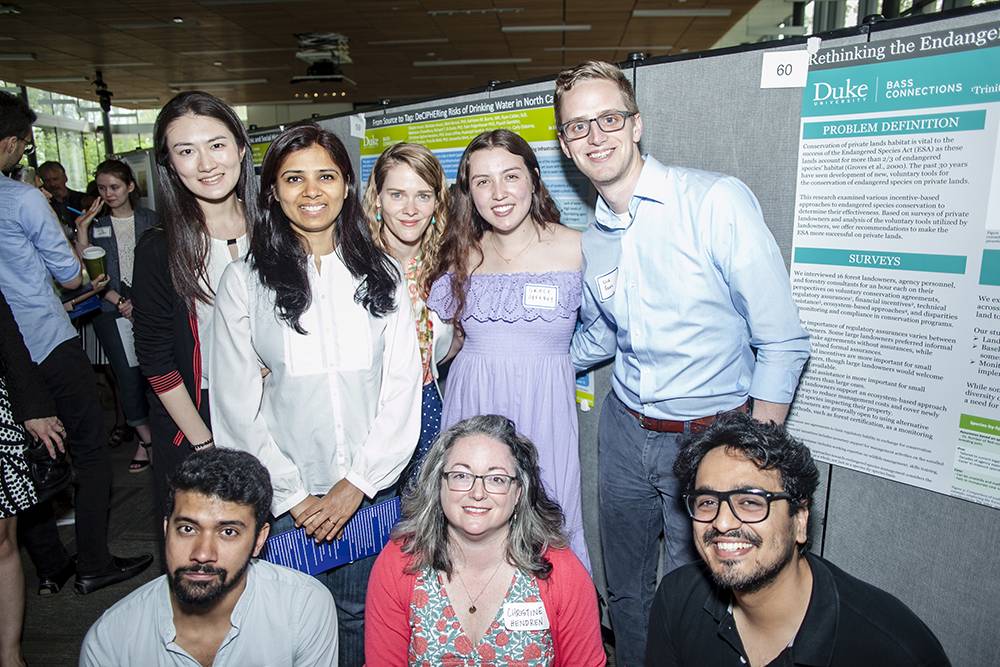
As the project manager of a group of faculty and students studying the history and risks associated with ozone-depleting chemicals, Duke graduate student Kathleen Burns spent a lot of time finding and assembling historical materials to distribute to her team.
It was a time-consuming task, and it took Burns a while to realize that hunting down all these news stories, government reports, scientific articles and other documents wasn’t her job.
That realization was freeing, as was her subsequent act of delegating the research to other team members. Doing so made her a better project manager, which, after all, was her role.
“What I realized is that it took away that experience by doing it for them,” said Burns, a doctoral student in English. “It was a good moment to draw boundaries. I realized that my doing all that work was not actually being a good project manager. I realized I had to let go of some things.”
Project management is a skill critical in myriad professions both outside of and, increasingly, within academia. It is not traditionally taught within the relatively narrow confines of many doctoral programs. At Duke, several new initiatives are now teaching project management, communication and other team-oriented skills to better prepare graduate students for a fast-changing and increasingly interdisciplinary world.
“Managing a project overlaps into the world of academia in specific and useful ways,” said Liz Milewicz, head of digital scholarship services for Duke University Libraries. “People have to think about timelines, resources and getting research out. There are lots of steps and you have to coordinate work with a lot of people.”
In her library role, Milewicz often works with student teams working on digital projects. She also taught project management skills at a recent campus boot camp presented by Bass Connections, a Duke program that combines faculty, graduate and undergrad students to tackle real-world problems from a variety of academic perspectives.
She is also teaching a similar course through Duke’s Doctoral Academy, an initiative specifically designed to help PhD students broaden their skill sets to be marketable either within academia or outside of it.
Milewicz, who earned a PhD in philosophy from Emory University, believes this training is particularly useful for students in the humanities and social sciences, where graduate work has long been largely a solitary pursuit.
“Especially in the humanities, we aren’t trained to do group projects, and most of us aren’t trained to work in teams,” she said. “But having project management skills helps you do your academic work and helps you work with other people, which is endlessly helpful.”
For a few years now, Bass Connections leaders have encouraged the faculty who lead the project teams to appoint a graduate student, postdoc or staff member as a project manager. The benefits include better research outcomes, more mentoring for undergraduates and a rare professional development opportunity for the project manager. The recent boot camp is a new effort to better prepare individuals for this role, as is a partnership last year with a medical school initiative called Duke Project Management Community of Practice – that offered a series of lunchtime sessions on these topics.
Bass Connections teams, of which there will be 66 next academic year, tackle all sorts of issues including topics focusing on global health, brain science and the environment. Most teams appoint a project manager, and common challenges often include communication, the efficient use of time and ensuring all team members know their specific roles and how they fit.
Among the tools Bass Connections stresses for its managers is a project charter – a simple document laying out the team’s goals, individual tasks and a timeline.
“It doesn’t seem like rocket science, right?” said Laura Howes, the Bass Connections director. “But we’ve seen that teams don’t do this sometimes, and when we look at where teams struggle, it’s because people don’t have a clear vision of individual roles and how each person contributes. To move a team forward, everyone needs to understand the goals and how they can contribute.”
For Burns, the project manager on the 2017-18 ozone-chemical project, another critical skill was learning to serve in a role that included managing the professors on her team. The Bass Connections group included six faculty members, and Burns struggled at first to incorporate them efficiently and gain confidence in how to effectively lead in multiple directions.
“I was helping to manage their time and schedules and prioritizing for them and being honest,” she said. “Sometimes they didn’t have to be at a meeting, and so I could tell them so. At other times, it was crucial that they be there because we needed their input.”
Burns clearly did something right. She went on to lead a second Bass Connections team this past academic year, after which she was named one of two winners of a Bass mentoring award for her work with students on her team.
She’s now leading yet another project, through a summer team-oriented initiative at Duke called Story+. She’s working to find the elusive perfect mix of structure and independence for the students on her team.
“I’m trying to impose some structure, but you have to find a sweet spot,” she said. “You can really generate some creativity and freedom, but if it’s too open-ended it can be disorienting. Trying to help students find that is what I’m most aware of right now as a project manager.”